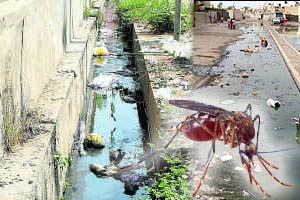| Chennai India | Transport | Chennai Real Estate | Home Issues | Education | Destination | Recreation | Chennai Hotels | Cars in India |
|
Home Issues
Pongal
December Festival
Henna Hair Dye
Home Flooring
Chennai Furniture
Home Furnishing
Ayurveda Treatment
Rainwater Harvesting
Navarathri Festival
Dengue Fever
Chickungunya
Summer Sunscreen
Heat Rash
Kanjivaram Silk Sari
Madras Filter Coffee
Vastu Shastra
Vastu Tips
Air conditioning Tips
|
Chikungunya FeverChickungunya fever is taking epidemic form in many parts of India. This form of viral fever is an alphavirus that is transmitted to humans when bitten by an infected mosquito. Chickungunya is the Swahili word for ‘that which bends up’. This is due to the stooping gait that many an afflicted person develops due to the acute body and joint pains. This strain of virus was first isolated and identified in the 1950s in Tanzania. Chickungunya virus is noticed in tropical countries. Aedes aegypti (the yellow fever mosquito) is the primary vector of chickungunya virus to humans. This mosquito tends to bite during the daytime. Typically these mosquitoes are infected due to feeding on infected humans, monkeys or other animals. It however does not get transmitted among people. Typical symptoms of chickungunya include fever, headache, nausea, rash, fatigue and joint pains. The infection can last anywhere from a few days to a couple of weeks. Chickungunya virus is classified as an arthritis virus since patients complain of incapacitating joint pains or arthritis. There is no vaccine or treatment for chickungunya fever. The patient is advised plenty of rest and fluids. Infected persons are often prescribed ibuprofen or paracetamol to alleviate severe body pains. In most cases, chickungunya is self-limiting and is rarely fatal. In some cases, persons suffering from a bout of chickungunya are likely to experience body pain and joint pain for some weeks or even months after the viral attack. Nearly 12 lakh cases of chickungunya have been reported from Karnataka, Tamil Nadu, Kerala, Maharashtra and Andhra Pradesh. Blood tests such as ELISA or PCR tests may reveal presence of antibodies or antigens. Preventive measures
|

|
|
|
||